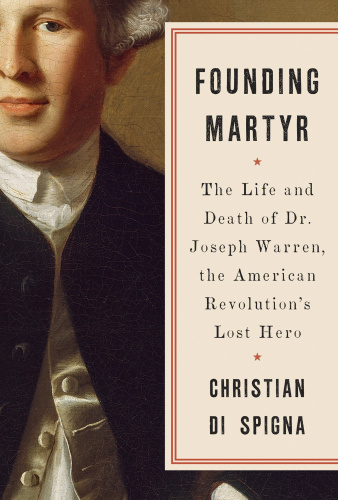
Founding Martyr
The Life and Death of Dr. Joseph Warren, the American Revolution's Lost Hero
کتاب های مرتبط
- اطلاعات
- نقد و بررسی
- دیدگاه کاربران
نقد و بررسی

June 1, 2018
A fresh biography of an underappreciated figure in American history.John Trumbull immortalized Dr. Joseph Warren (1741-1775) in his painting The Death of General Warren at the Battle of Bunker's Hill, which depicted the demise of the young physician and military officer. In his first book, Di Spigna, a speaker and volunteer at Colonial Williamsburg, reminds readers that Warren was more than a man who sacrificed his life for the cause of liberty. The son of a pious Massachusetts farmer, Warren attended Harvard, where the future revolutionary developed his oratorical skills when he was not committing pranks such as nailing his roommates' shoes to the floor. His training as a physician coincided with the post-French and Indian War crisis between Britain and her American Colonies, and Warren would hold several positions in the Massachusetts resistance: head of the Boston Committee of Correspondence and North End Caucus, president of the Massachusetts Provincial Congress, and chairman of the Massachusetts Committee of Safety. He delivered two prominent orations on the Boston Massacre, wrote numerous articles and pamphlets, authored the Suffolk Resolves, sent Paul Revere on his famous ride, operated a spy ring, and participated in the battles of Lexington and Concord. In short, Di Spigna persuasively argues that Warren was "a rare combination of statesman and warrior" and that "his effective arsenal of voice, pen, and sword was unrivaled by any other patriot." Yet the author does not neglect Warren's medical career. He was one of the most prominent and respected physicians in Massachusetts, inoculating hundreds of people against smallpox without a single death. Warren was also a prominent Mason and devoted family man.In his first inaugural address, Ronald Reagan referred to Joseph Warren as "a man who might have been one of the greatest among the founding fathers." Hopefully, Di Spigna's insightful biography will rekindle public interest in Warren, a man who deserves to be remembered for more than his death at Bunker Hill.
COPYRIGHT(2018) Kirkus Reviews, ALL RIGHTS RESERVED.

Starred review from June 25, 2018
Di Spigna argues that, although Joseph Warren (1741–1775) remains largely unknown, he was “one of the most important figures in the movement for independence,” a characterization amply supported by the evidence presented in this revealing and insightful biography. The doctor-turned-revolutionary wrote the Suffolk Resolves, “the pivotal documents that shaped the policies of the colonies on the eve of independence,” ran the rebels’ first spy ring, ordered Paul Revere’s midnight ride, and served as a military commander before George Washington. During the decade preceding his death, starting with the Stamp Act, “Warren was at the center of almost every major conflict” in the Boston area. He died at Bunker Hill in 1775 because he remained on the battlefield until his troops had all gone, and he was regarded as so dangerous by the British that his corpse was decapitated and mutilated. Di Spigna incorporates diligent research, enhanced by analysis of primary sources only he has tracked down (such as medical records Warren maintained for his practice), into a gripping narrative that doesn’t shy away from the darkness in his subject, including Warren’s family’s ownership of slaves. This book will give readers a fuller picture of American leadership before the active engagement of those now called the founding fathers.

July 1, 2018
The 34-year-old Boston doctor, widowered father of four, and newly minted major general Joseph Warren (1741-75) died at the Battle of Bunker Hill. But because the Declaration of Independence was more than a year away and the Revolutionary War hadn't yet begun in earnest, Warren missed out on the mythical status his contemporaries George Washington, John Adams, and Paul Revere would later achieve. Nevertheless, writer Di Spigna considers Warren instrumental to Boston's insurrectionist movement of the 1760s and 1770s, and thus a "founding grandfather" of the American independence. As he gained more roles within the revolutionary cause--orator, spymaster, leader of Boston's Committee of Correspondence--Warren found himself at the center of famous historical events: as instigator of Paul Revere's famous "Midnight Ride," planner of the Boston Tea Party, and an early martyr at the Battle of Bunker Hill. Di Spigna, a Colonial Williamsburg volunteer and enthusiast of the era, sometimes borders on hagiography with an overt mission of boosting Warren's historical prominence. VERDICT Still, this concise and accessible primer on a significant but mostly forgotten figure offers a great read for those interested in early American history beyond the usual names.--Chad Comello, Morton Grove P.L., IL
Copyright 2018 Library Journal, LLC Used with permission.

August 1, 2018
The short but eventful life of Dr. Joseph Warren should have earned him a place in the pantheon of heroes of our struggle for independence, alongside Samuel and John Adams, Thomas Jefferson, Benjamin Franklin, and George Washington. His death at 34 at the Battle of Bunker Hill, granted him the status of selfless martyrdom, yet his reputation and fame quickly dimmed. In this unabashedly admiring biography, Di Spigna strives to restore Warren's fame. By his mid-twenties, he was a very successful Boston surgeon, one with radical political views, who was rising quickly in the city's turmoil during the 1770s, even after his wife's death left him responsible for four young children. Warren wrote seditious tracts against the royal government, sent Dawes and Revere to spread the word to Lexington and Concord, and then helped attack British troops. While Di Spigna's account verges on hagiography, readers may sense that Warren was a romantic adventurer who preferred fighting to the pursuits of healing and family life. This is a valuable reminder that it takes all types to make a revolution.(Reprinted with permission of Booklist, copyright 2018, American Library Association.)

























دیدگاه کاربران